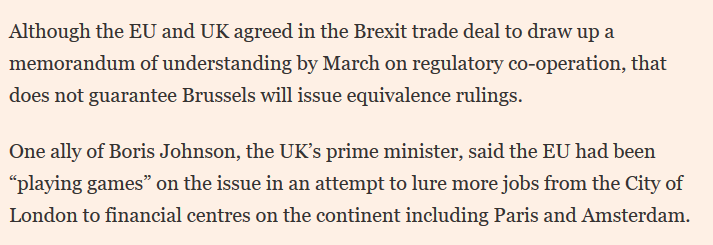
This is mostly about the difference between being in a single market and customs union, and a 'free trade agreement', plus the fact UK-EU trade is set up for the first and went into the second under-prepared. theguardian.com/politics/2021/…
So you can (and should) be in a permanent negotiation with major trade partners to ease trade issues, but that ultimately can't return you to the trade flows we had before December 31 under this structure of relations, and we shouldn't pretend otherwise. 

Nor can we make up for the increase in trade barriers to the EU with agreements with other countries, for the rise in barriers to trade in moving from SM / CU to FTA is much greater than the easing of trade barriers between FTA and WTO.
As I might have mentioned a few times the UK government has moved against free trade, and virtually all economists will agree that this will have a hit on trade flows and GDP. We don't know how much, because no country has done what the UK has in recent history.
Question, why are Free Trade Agreements good enough for trade in North America and South / East Asia, but not Europe? Because 30-odd countries have chosen deeper relations, so the UK is relatively worse-off. You can't pick your neighbours (though US or China equally tricky ones).
Question, will the difficulties in UK-EU trade stabilise? Yes, probably, but at a lower level (how much we don't know), higher cost, and higher risk of disruption. But we're entering a period of economic adjustment to this which could last a few years.
Question, what could government do to facilitate the transition in UK-EU trade? Appoint a dedicated Minister, be honest about the changes, listen to business, invest in extra resources in Brussels, and seek to negotiate some of the worst problems away.
Question, will 23 virtual blockchain enabled, red tape busting, crypotcurrency powered, tax eliminating, Freeports, named after prominent politicians who claimed Brexit equals free trade, help?
No.
No.
Question, will pretending the EU doesn't exist or focusing on ensuring a future government will find it harder to change trade relationships with the EU help?
What do you think? But this doesn't exactly scream "mature post-Brexit government"
What do you think? But this doesn't exactly scream "mature post-Brexit government"
https://twitter.com/christopherhope/status/1348038322527100928
• • •
Missing some Tweet in this thread? You can try to
force a refresh





